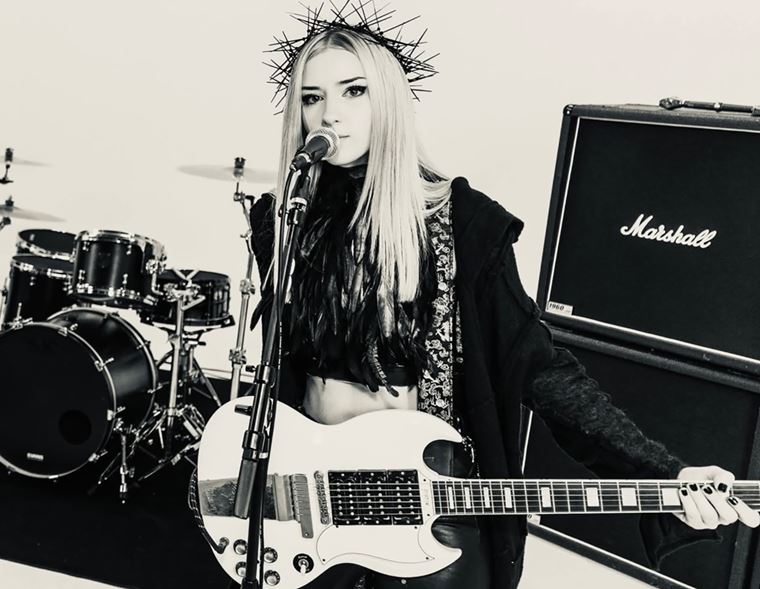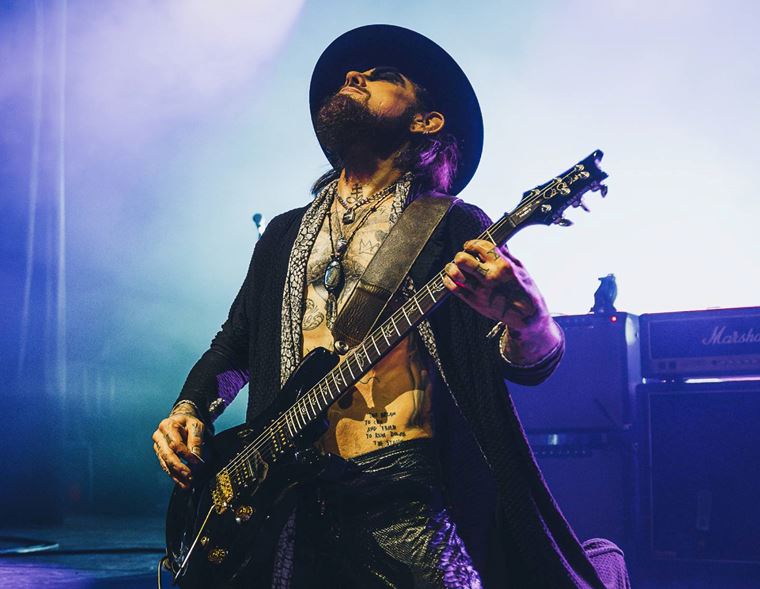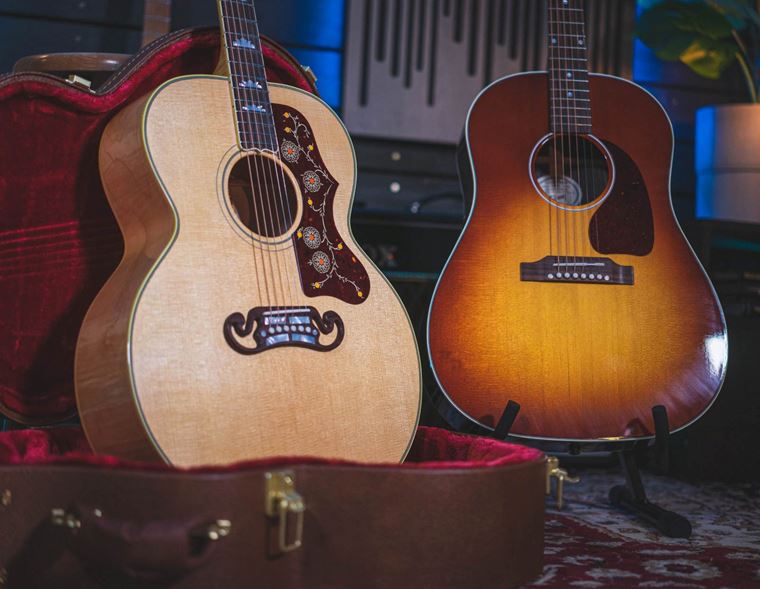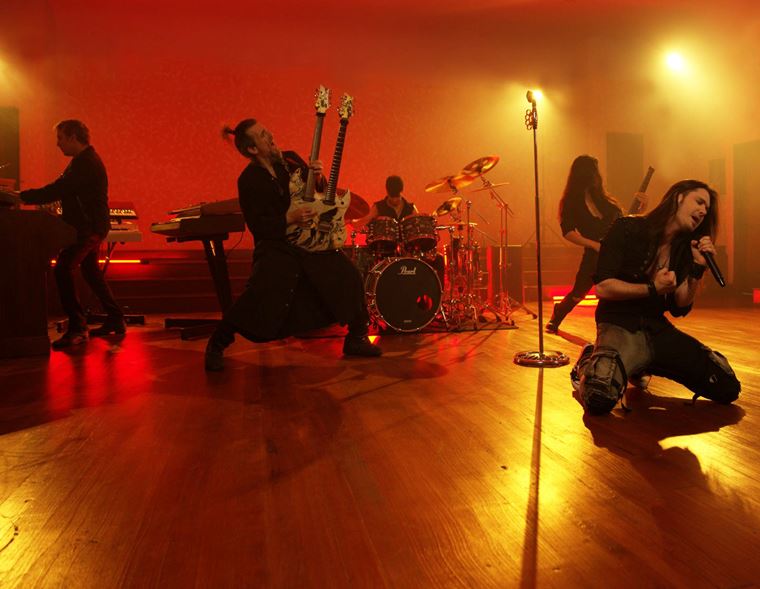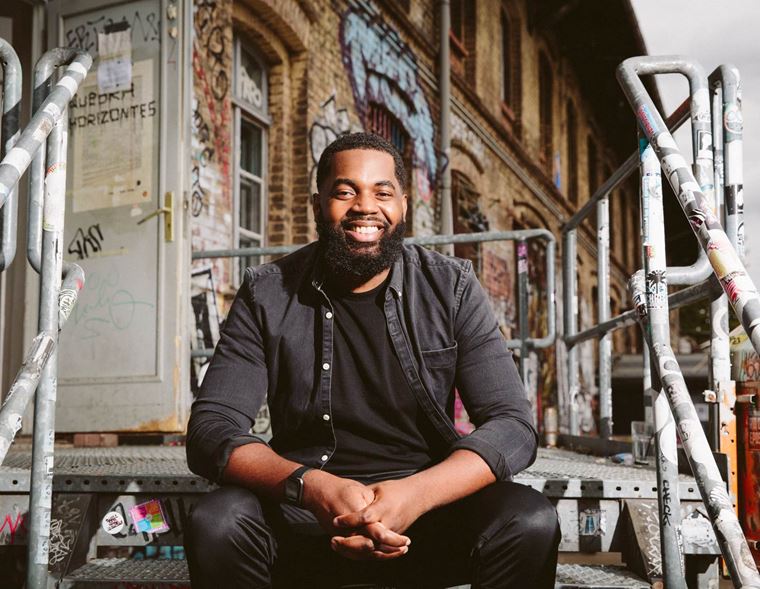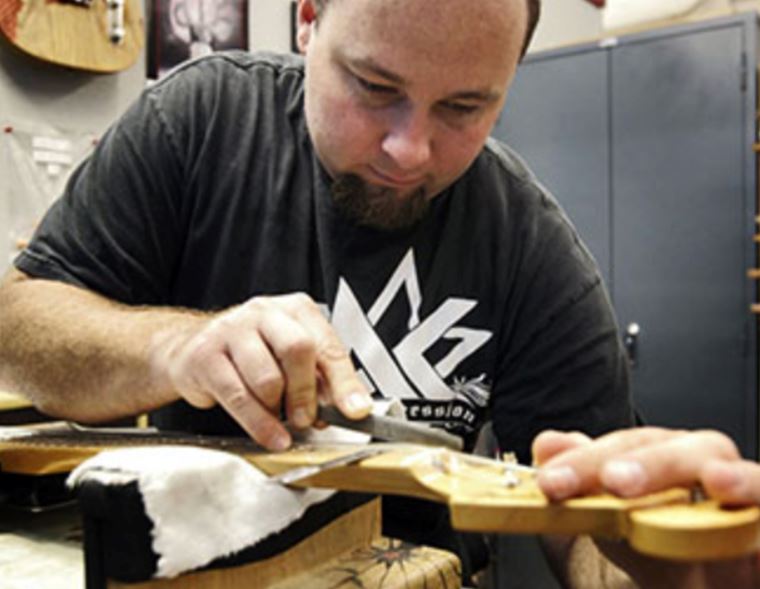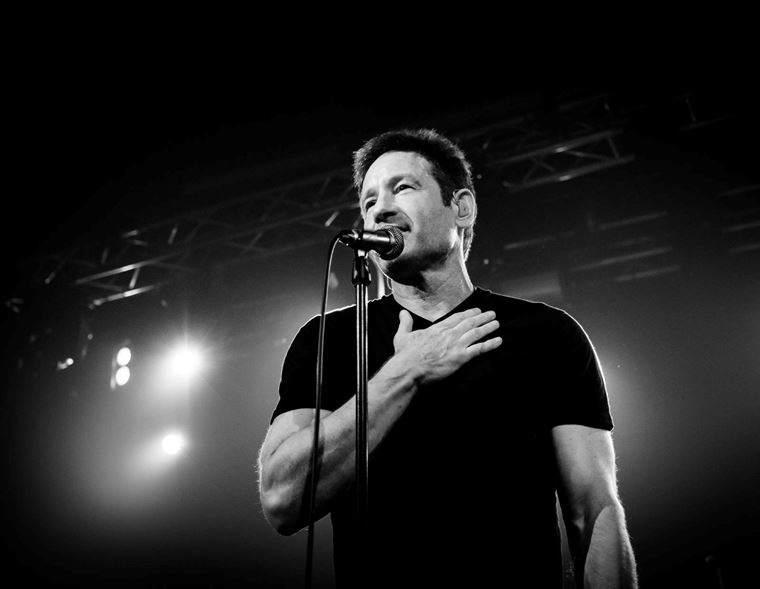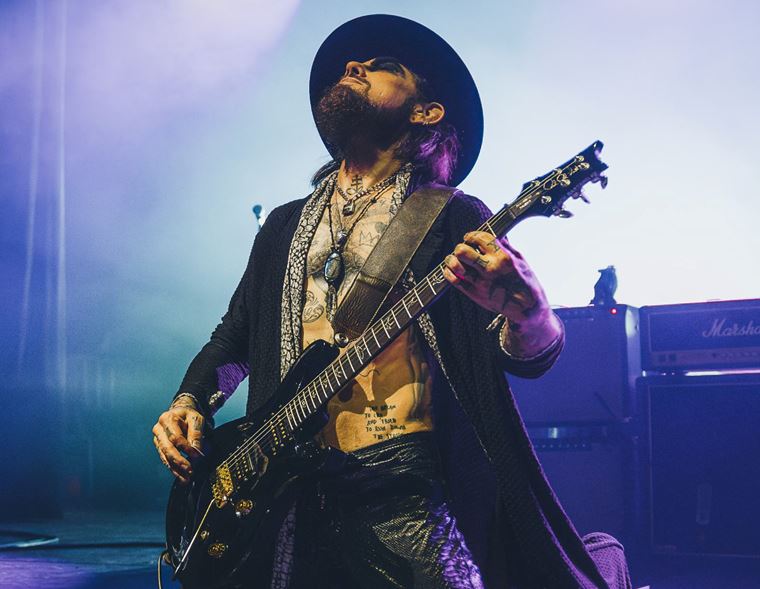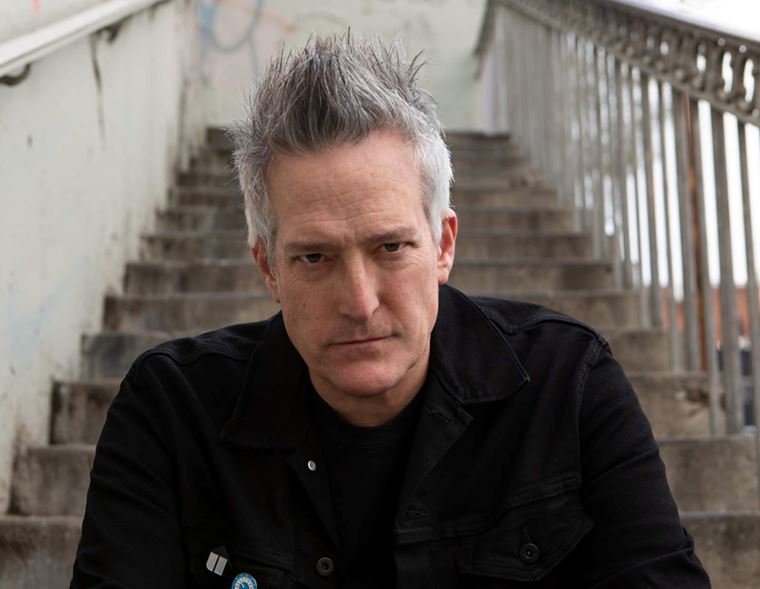LAMB OF GOD's Mark Morton on Going Solo, Chester Bennington and Mark Lanegan
Published on 24 January 2020
Lamb of God are a mighty proposition. Musically, they pull no punches whatsoever, delivering massive grooves with riffs that seem to be wearing tactical armour! For the last two decades, the Virginia quintet have done much to define the sound of modern Metal. Bringing hardcore intensity and coupling that with memorable thrash/death/groove metal riffs and a frenetic sense of dynamics, Lamb of God have, across 9 albums, become one of the most significant Modern Metal bands.
Mark Morton is one half of the band’s two-guitar assault team, along with Willie Adler. He’s also a significant contributor of lyrics and plays a high proportion of the leads and solos. Recently, Morton has spread his wings and launched a simultaneous solo career. His debut album, Anesthetic, was released last year and contains a collection of high-quality songs with some stunning collaborations. Myles Kennedy from Alter Bridge appears. One song has the late-great Chester Bennington from Linkin Park supplying vocals, with another bearing the distinctive baritone of Mark Lanegan. Bass on many of the tracks is supplied by Alice in Chains’ Mike Inez, and drumming dutues are performed by players such as Korn’s Ray Luzier and Clutch’s Jean-Paul Gaster.
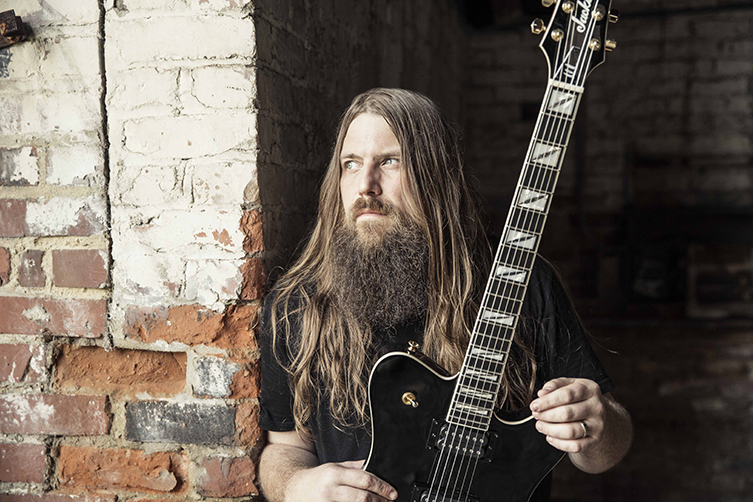
Talk about a power team!
This year, Mark embarked on a short acoustic tour to play these songs in a stripped-back manner, as well as to promote his brand new, mostly acoustic EP, Ether.
With no little sense of excitement, I ascended the steps of the venue in town and awaited my opportunity to talk to Mark about this new part of his career, as well as grabbing a few details regarding his ‘day job’! I grabbed a seat and took in the soundcheck (acoustic guitars are not the easiest things to ‘dial in’ sound-wise in empty clubs), whilst the local support pinned their merch to the walls and chatted energetically.
In person, Mark is very laid back and friendly, with a placid, easy energy. Slightly wild blue eyes look out from his long hair and supersized beard and give the impression that he’s taking in more than he lets on. We found a spot to chat in the venue’s office and, for the next half hour, enjoyed a very stimulating conversation, frequently punctuated with laughter and nonsense. It doesn’t take too much to make Mark laugh, which is good news for me and also a sign of his generous nature.
In this following chat, you’ll hear about Mark’s writing process, the collaborations, his house in Virginia, and some interesting insights into Lamb of God. What you’ll find missing is chat about electric guitars and amps, since we were there primarily to talk about the solo career and the acoustic tour. However, this is guitarguitar! We have plenty of chat about guitar playing!
(Note: I’ve opted for the US spelling of ‘Anesthetic’ throughout this interview over the European ‘Anaesthetic’ since Mark is from the US and that is the album’s official title.)
Here, then, is the conversation in full...
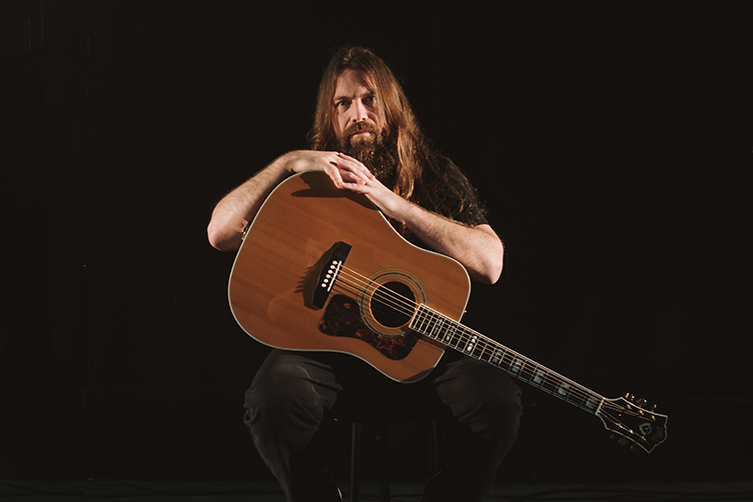
guitarguitar: So, were you having sound problems up there today?
Mark Morton: Yeah, the room’s just a little weird. You know, it’s just, these acoustic guitars and these kind of big boomy rock clubs...
GG: Yeah.
MM: You can make an acoustic sound amazing in a nice quiet isolation booth with a beautiful mic in front of it and a controlled strum, but you get in, basically, a concrete square room with a big PA, it’s a little more challenging, but I think we got it.
GG: it sounded good from where I was, but I guess it’s different on stage.
MM: Yeah, yeah.
GG: So, tonight is an acoustic show, but the solo record is anything but! It’s a bunch of great big, distorted, Rock songs with all kinds of singers on it!
MM: Sure.
GG: I thought: how the hell is this gonna work? Haha! So, is that what you’re gonna be playing tonight? Songs off Anesthetic?
MM: Yeah, so there’s Anesthetic, which came out last year, and then I just did an EP called Ether.
GG: Yes, new single released today!
MM: New single drops today, yeah! Um, and Ether is more acoustic based. I’m not gonna say it’s entirely acoustic, because there’s drums, bass n guitar too, but there are...umm, two songs that are pretty much entirely acoustic. The other ones have a really strong acoustic component. So yeah, to answer your question: I’m not playing all of Anesthetic, because some of Anesthetic is just kinda metal, you know what I mean? A song like The Truth is Dead with Alyssa (White-Gluz, lead vocalist of Arch Enemy) and Randy (Blythe, Lamb of God vocalist), that’s a pretty metal song. The Josh Todd song, Back from the Dead, doesn’t really translate to acoustic...
GG: That’s the thing, it’s what gets lost in translation.
MM: Yeah, yeah yeah! (laughs) But, there’s some that really do. Imaginary Days does well, Axis, the Mark Lanegan song, does really well...there’s a song called Reveal and of course we have to play Cross Off (which features Chester Bennington), cuz that was such a big song for me. So, we kinda rework that one a little bit.
So, what we’re doing tonight is, I think it’s about 5 or 6 songs off of Anesthetic, re-imagined and acoustic, and then I’ll be playing the new EP, Ether, pretty much in its entirety, um, and then some covers too. We’re gonna do a few covers.
GG: Ok! So, for the Anesthetic tunes, when you’re re-interpreting them for acoustic guitar...
MM: Yeah...
GG: How are going around that? Are you picking out the riffs? Or changing tunings?
MM: Mmm, it changes from song to song, Cross Off probably being the biggest example. That one went through the most wholesale kinda changes. I don’t know how familiar you are with the song but it’s pretty riffy.
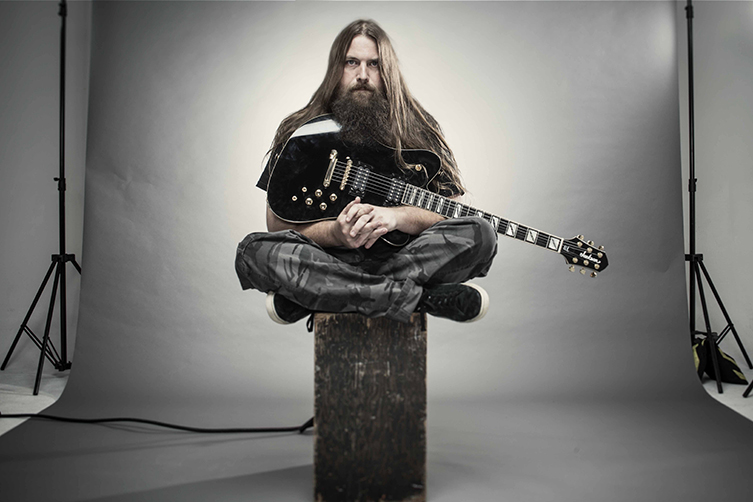
GG: Is that the Chester one?
MM: Chester, yeah.
GG: Yeah, I know it well, yeah.
MM: So it’s pretty riffy. But the thing about Cross Off is that there really is a song in there. There’s a bass chord progression and a melody over the top of it that fits: the essence of the song is there. So that’s really what we focussed on. Joe, my guitar player Joe Harvatt, well, you heard him playing in there...
GG: Yeah, he’s a wicked player.
MM: Amazing, yeah! So, him and I sat and just kind of worked it out. There’s a song called Save Defiance that Myles Kennedy sings on, that one went through some changes, too. We just try to kind of get to the essence of the song and basically support the vocal melody in an acoustic way. Not so much really trippin’ too hard on making the riff the same: it’s more about the chord progressions underneath, supporting the melody and still doing something cool on the acoustic besides just (mimes constant strumming).
GG: Yeah, yeah, that’s okay occasionally, but for a whole set? You need to do other things.
MM: Yeah, so I feel pretty good about where we’re at. This is only the third show, so we’re still kinda getting our legs. By the time we get to London, we’ll be ready to go and then the tour’ll be over! (laughs)
GG: I know! Raging! Um, and is the vocalist for tonight, is that the chap who’s on your new single? Is that Mark Morales?
MM: That’s Mark Morales. He sings two songs on the Ether EP and he sings the song Blur on Anesthetic.
GG: Right. And he is doing the Mark Lanegan tune tonight?
MM: Yeah.
GG: I was sitting there waiting for you and when I heard him do that, I thought it was a recording at first! Like a backing track with Mark’s voice!
MM: Sounds great, man.
GG: That’s not an easy voice to do!
MM: It’s not! None if it is, and here’s the thing about Mark Morales: last March, we did a full US tour as a band: electric guitars and drums, all that. And, uh, Mark’s my live singer: he did that tour as well, and he did that whole Anaesthetic album. We played the whole album on that tour, so he was singing women’s voices, he was singing Alyssa’s part, he was singing Naeemah Maddox’s part on Reveal, he’s singing Myles Kennedy, he’s singing Chester Bennington, Mark Lanegan, Randy Blythe...he just does it all. He’s a spectacular singer.
GG: Did you already know he could handle all of that, or did you just like him and give him a shot?
MM: I knew Mark already and our producer, Josh Wilbur, had done some stuff with his band, Sons of Texas, as well. I was familiar, I knew he was a great singer. I knew we’d figure something out because he was good enough: I didn’t realise...
GG: That he was gonna smash it?
MM: That he was gonna smash it! I’m gushing about him because I think he’s an unbelievable singer.
GG: This is good for him, because, when you google ‘Mark Morales’, you get someone else.
MM: I know! You get some rapper guy or sport guy or something.
GG: Exactly! He’s like this secret singer.
MM: Yeah. He’s phenomenal.
GG: Yeah, so...you know, I have these questions here but often it’s better to just chat.
MM: And just go off on a tangent, yeah. That’s alright!
GG: Cool! So, acoustic guitars. What model are you playing?
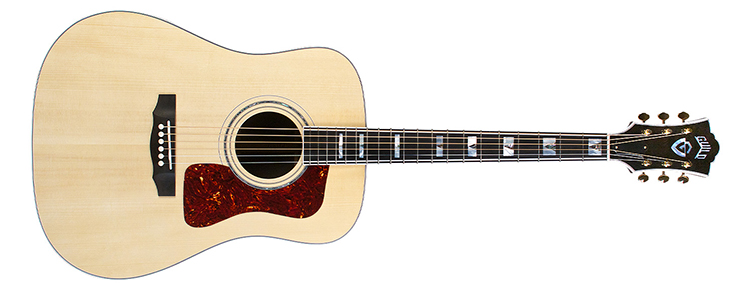
MM: Guild. I’ve had that one, that kind of blonde-coloured one, the D-55, for, gosh, ten years or so. Um, I recorded the entire Ether EP with that. And then the kind folks at Guild, when I was, y’know, coming over here, loaned me the D-55, the Sunburst one. I do a little bit of tuning changes and I just wanted a backup as well as for tuning changes, so they take good care of me. Beautiful guitars, man. Beautiful guitars, they sound great.
G: And, what tunings are you using then?
MM: Um, ok so Standard A-440, standard E tuning, and then that tuning with a drop-D, and we’re doing a Black Crowes song that’s in Open E.
GG: Right, so everything you’ve spent decades learning goes out the window when you change tuning!
MM: The thing is, is that I normally, uh, I recorded the Black Crowes song, She Talks to Angels, I recorded it on the EP, and we did a full band version of it. Lizzy Hale sings it. She sings the shit out of it! And I played slide on that song. Whenever I play slide – and I love to at home – I was thrilled at getting the chance to record slide since I don’t get to do that kinda shit with Lamb of God...
GG: Yeah, yeah!
MM: So, I played slide but every time I play slide, I play in Open G. So, I recorded the song, and I played my slide in Open G, but the song is in Open E, right? So now I’m trying to figure out what to play, and none of my licks work! (laughs) It’s all different, you know what I mean?
GG: Haha, yeah totally!
MM: So, I’m kind of learning in front of people have to play slide in Open E. Some nights I’ll play more slide than others, it depends how I’m feeling!
GG: How brave you’re feeling!
MM: Haha, I have it (the slide) there so I might pop it off and play some stuff, I might shake it off and play straight!
GG: Do you go for a glass slide?
MM: A glass slide on my ring finger, yeah.
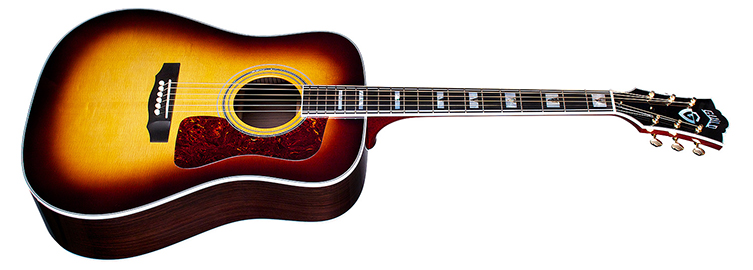
GG: And, you know, plectrums are a thing for me: I’m always interested in what people use. I’m wondering: do you use the same pick for acoustic playing as you do for electric?
MM: Yeah, I don’t know, I mean, I’ve never toured playing acoustic. Normally, I guess around the house I would, just because I like 1.14mm and I have bags of them all over the house, you know?
GG: Sure.
MM: But on this one, I was kinda suggested to me that I might try something lighter. And I have, so it’s a Dunlop Tortex and I think it’s a .86mm, does that make sense?
GG: .88mm maybe?
MM: Yeah, maybe an 88, yeah, yeah. So, I’m using those, and I like ‘em. They’re a little better for the strummy stuff, I find. Some guys say a heavy pick’s better for acoustic. I guess it depends on your touch.
GG: The thinner gauge plectrums guide you away from too many bad ‘lead guitar’ habits on the acoustic, if you get me.
MM: Yeah, it’s weird playing lead on acoustic. You can’t really play it like an electric. You can try...
GG: You can try, you maybe shouldn’t though! (laughs)
MM: Yeah, right! And if you can, maybe you shouldn’t!
GG: Haha! Just randomly, as an aside, I’ve always wondered about this. On the Lamb of God stuff, do you do most of the lead guitar?
MM: Yeah, mostly. The solos and stuff?
GG: Yeah.
MM: That’s mostly me.
GG: and in terms of coming up with riffs and so on, do you and Willie (Adler, other Lamb of God guitarist) both come up with a bunch?
MM: Yeah. Yeah, we do, we both, uh, a lot of times, WIllie and I will both come in with completed – I say completed, they change – we’ll bring in demos of songs, fully demoed out. So there will be Willie songs and there will be Mark songs. The last album, well, the album that’s just about to come out...well, uh, a large part of our previous album, Sturm and Drang, we sorta mixed that up. We went back to what we did on the first coupla albums where we were like: ‘hey, I got these two riffs that fit together, what do you think?’ and the other guy might have an idea. So it became collaborative.
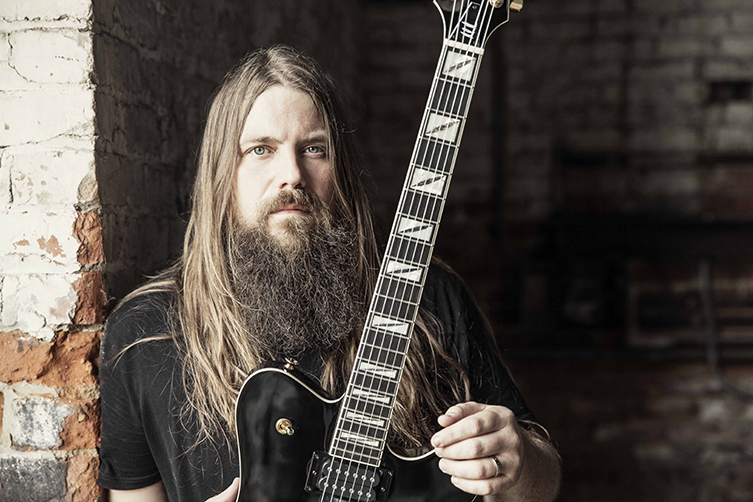
I’d say the first album, New American Gospel, was pretty, like, we were both working on songs, and then around Palaces (As the Palaces Burn, second Lamb of God album) we started being like ‘this is my song’ and, you know, it would go like that. As I say, in the last couple of albums, we started getting back to that collaboration. And that was cool, cuz either way you still get Willie and I: we play so differently and have such a different kind of styles that when you blend them together it sounds like Lamb of God. You still get that, it’s just a matter of: are you gonna get that in the same song, or are you getting that across an album.
GG: Right, like throughout the journey of the record.
MM: Yeah, yeah. So, we’ve just brought those elements a little closer together, kind of working on songs together a little more again. Sorta deliberately too, I think.
GG: Yeah!
MM: It was a conscious decision to be like ‘hey, let’s not finish things up so much’. We kinda bounce it off each other and see what kinda results we get.
GG: Creatively leaving space, or making space, for each other is awesome, it’s very healthy. Letting someone else have a bit of say over how a precious riff goes, when you want to be like, ‘No, that’s how you play it!’
MM: (laughs) Yeah! Right!
GG: So, talking about riffs. You’re sitting at home, you’ve got your guitar, you’re doing both solo work and Lamb of God work. I understand that the music’s dead different, but it’s still you sitting and playing a guitar, right?
MM: Mm-hmm.
GG: Do you just instinctively know, when you’re playing, which side of the fence a new riff is landing on? Or do you have a big stockpile of song ideas that just get put into the computer?
MM: Yeah, that’s a good question. So, the solo work...the whole concept of me kind of doing solo stuff really came to fruition because I was just throwing ideas into the computer and whatever came out, came out. In the course of that, I’d be knowing that ‘this isn’t for Lamb, but it’s cool, and I’ll just put it over here’, you know what I mean?
GG: There’s a ‘cool pile’ haha!
MM: Yeah! And that cool pile started piling up after a few years. I played it for my producer, and he was like: ‘this is indeed a cool pile: let’s develop some of this stuff’. So that was really how Anaesthetic started. So, I was always when Lamb is Lamb.
GG: Ok.
MM: You know what I mean?
GG: Yes.
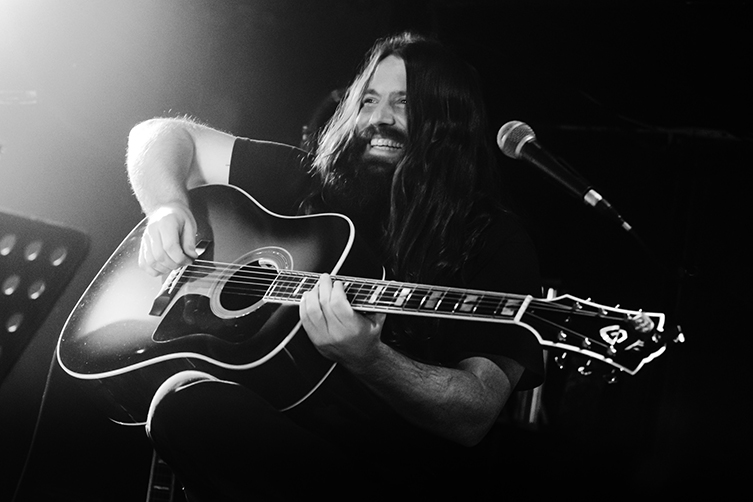
MM: And then there was all this other kind of extraneous stuff that wasn’t not being developed because it wasn’t good enough, it just didn’t fit stylistically in the context of Lamb of God, within those borders. So, Anaesthetic, the album, was realised. So now, I think, through that process and through that experience really, now I’ve kind of become comfortable with writing. Like, now, I can sit doing and say I’m gonna write stuff for a solo acoustic EP. And I will do that, and I will simultaneously be writing for Lamb.
I think it really helps Lamb of God because there have been times where I’ve kinda tried to sort of force-fit some of this Rock stuff, or some of this real pretty stuff...
GG: Ah, yes...
MM: And sometimes with good results! But sometimes with sort of frustration because it’s not working or doesn’t gel. Doing this side-solo stuff gives me a destination for all of that. I can still reference, stylistically, some of the things in Lamb, but I don’t feel so nervous and anxious and frustrated about trying to get this in there. I mean, I imagine you write music?
GG: I do, yeah!
MM: Of course, right? So, I don’t know if you’re the same as me, but I have this feeling like: I can always tell when I’m about to have a bunch of stuff coming, like in a real creative mode. It’s almost like my brain’s gonna vomit. (laughs) I tell my girlfriend, I’m pacing around, she’s like: ‘what’s going on?’ and I’m going: ‘I just...I gotta write!’ I dunno what it is but something’s coming out, you know what I mean?
GG: Big time!
MM: And, uh, I dunno how I got on that tangent! So, with Lamb, like...
GG: It means with the Lamb of God stuff, you can hit them with 100% Lamb of God.
MM: I can, yeah. It doesn’t mean I can’t touch this kind of stuff (with Lamb of God), it just means that I don’t have to. When that stuff comes out, I’ve got a place to earmark it. There’s a place for it to exist. That’s a really great feeling, as an artist, as a songwriter, as a creative person. To have that outlet, I’m just so lucky, man. I’m the luckiest dude I’ve ever even heard of.
GG: Haha!
MM: Haha, it’s true.
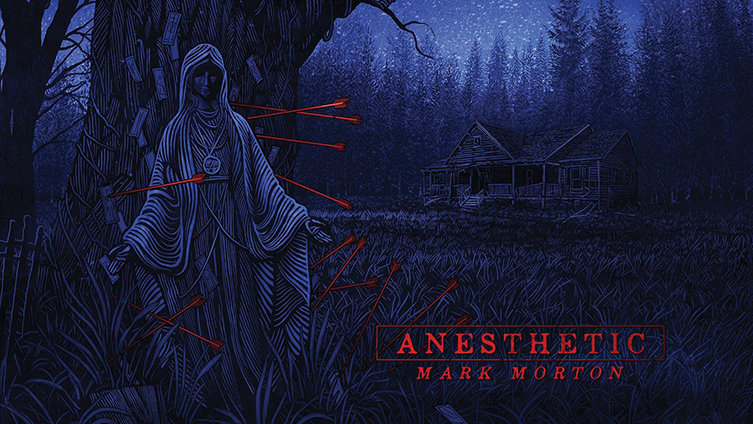
GG: One thing, I really love the artwork on Anesthetic (by artist Daniel Danger)! I read that the house in the picture is a messed-up, horror movie version of your actual house?
MM: It is! It’s like a really sad, decrepit interpretation of my property back in Virginia.
GG: Is that rural Virginia?
MM: Yeah, it is.
GG: That was what I was kind of hoping for a Lamb of God guitarist!
MM: Out in the sticks with the trees, right? It’s true! Haha!
GG: Does that feed into your creative process?
MM: Ummmm...
GG: Like how LA always rubs off on LA bands, and New York...
MM: Yeah, yeah! Maybe! It’s certainly not a strategy: that’s home.
GG: Oh, yeah totally!
MM: Yeah, its home.
GG: But like that surrounding atmosphere: the trees and such. You go for a walk, you come back with ideas...
MM: For sure! For sure. I have a little studio, separate from the house, tucked out back, and I can, y’know, just hide away...the band rehearses there, all the gear’s set up there. We do pre-production there and write. I think the privacy is big, it allows me to develop my ideas. I don’t know, I mean, I feel like you can write anywhere, but I definitely feel very comfortable there: I feel insulated and it can become a pretty creative space for me for sure.
GG: Sweet. And do you ever write when you’re on tour? On the bus or anything?
MM: Lyrics. Yeah, not music that often. On tour, I don’t get a whole lotta chances to play guitar outside of the show, particularly with Lamb because uh...you know, all the gear gets packed away in a truck and gets trucked away, and whether you’re flying or on a bus, whatever, on a bus there’s no room to break out your shit...
GG: And guitars are a pain to carry on a plane.
MM: Yeah, that’s true! And all the band are on the same bus. The crew are on a bus, but it still gets kinda crowded. But I write lyrics on the bus, that’s easy! All you need is a notebook and, you know, your head, so...
GG: Yeah. And when you’re writing lyrics, do you write lyrics for existing songs that you already know about? Are you just putting out words that will then become songs?
MM: I’m just putting out words. I don’t even know...I write a lot of lyrics for Lamb of God too...
GG: Oh! I didn’t realise that!
MM: Yeah, yeah! I write a lot of lyric for Lamb over the years. I just write, you know what I mean? And, whatever I’m working on, whenever there’s a piece of music that needs lyrics, I just start flipping through to see what I’ve got.
GG: And do you find that you write much more than you need? Or do you end up using most of it? Are their notebooks full of stuff just waiting?
MM: No, I kind of weed it out. Like, I usually know if it’s garbage. (Laughs) It’s the same with music, like everyone’s like: ‘man, you write the greatest riffs!’ I’m like: ‘Thanks, but to be fair, I only let you hear the good ones.’
GG: Right.
MM: Cuz there’s a bunch of shit.
GG: Hahaha! It’s good to know!
MM: haha, you gotta believe it! Same with lyrics! But, yeah, for every 8 or 10, I might get a good one.
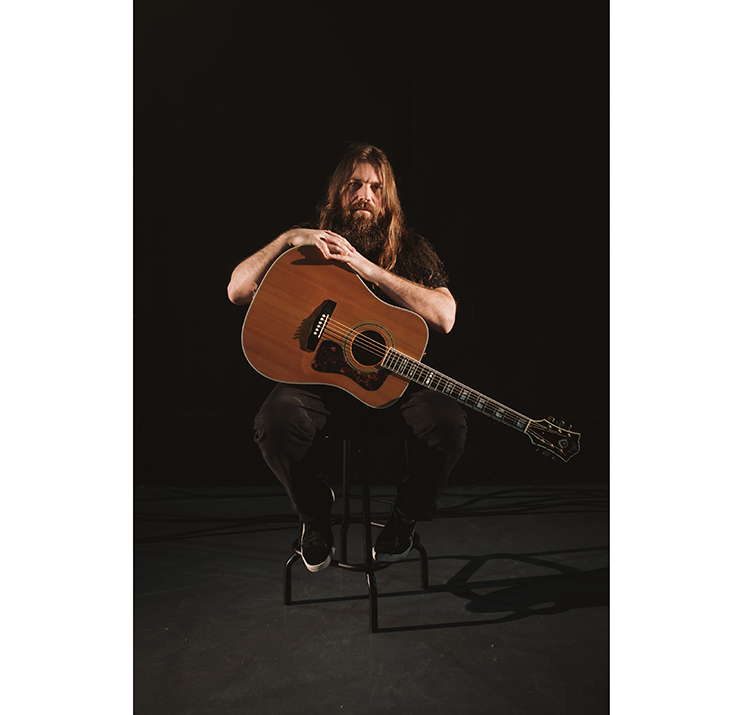
GG: Talking about riffs then, when you’re writing guitar riffs, do you instantly know when one is a keeper and one really sucks and has to get dumped?
MM: Um, well, sometimes the one you think is brilliant, isn’t. But sometimes you know instantly. I feel like they’re so different. Like, uh, I knew that Redneck and Walk with Me in Hell were bangers as soon as they...right out the gates. Even though Walk with Me in Hell took a long time to do. Cross Off, with Chester...you know, I’m kinda toggling back between Lamb and the solo stuff, but it’s all stuff I write, you know what I mean?
GG: Yeah, yeah! It’s your solo stuff we’re here for really anyway!
MM: Yeah, sure! Yeah, so Cross Off was...I worked on that for a long time. It took on different versions and different revisions. I knew that the chord progression was cool: I mean, I knew there was something sort of airy and atmospheric and landscape-ish about the chord progression but still heavy and still dark. It felt...(struggles for a word) kinda sonically complex. It was dark, but it also had this sort of expansive, field, landscape sort of...
GG: Expansive’s a good term for it.
MM: Yeah, so, um, I think when something has those sorts of layers to it, you can treat it different ways with the melody or the lead or something like that and just sort of steer it different places. I feel like there’s a lot of potential there. It felt special, I guess.
GG: The special quality was clear, but you still had to go through a bunch of versions.
MM: Yeah, cuz then, when you have a riff that special, or progression, or whatever it is, there’s this moment as a songwriter, when the song becomes really what it is. It’s no longer your song: it exists, and you’re just kind of a curator or a caretaker. It’s like having children: I don’t know if you have any, but I have a daughter. I used to think, before I had kids...this is probably a stupid analogy (laughs) but I used to think that when you had kids, they were your kids, just like a dog is your dog, but they’re not! They are themselves, you’re just in charge of taking care of them, make sure they don’t fuck up, right?
GG: Exactly!
MM: I feel kinda that way, in a much lower-stakes level, about a song. When it becomes what it is, it’s my job to make sure I can help develop it, make it the best version of itself it can be.
GG: Sure.
MM: There are a lot of decisions to make in that process, you know what I mean?
GG: Yes, including getting yourself out of the song’s way.
MM: Yeah! And you can fuckin’ blow it! Haha! Or you can really set it up into something special.
GG: What’s the phrase: snatch defeat out of the jaws of victory?
MM: (laughs) Yeah! Yeah ‘What is we brought in a DJ to do some scratching?’
GG: Haha! Bring back scratching in Metal! Let’s not!
MM: Hahaha!
GG: So, random question. I’ve never been to Virginia, but I’m enthralled with kinda rural, small-town horror, stuff like that. It seems that Virginia is a good place for that vibe, with Roanoke and all that kinda stuff. You know that place, right?
MM: What happened at Roanoke?
GG: It was a place where some Founding Father-types settled and mysteriously disappeared. They left traces, and strange signs or language or something carved into the trees.
MM: Oh yeah, the Lost Colony?
GG; Yeah, that’s it!
MM: Yeah, yeah yeah. (Mark’s being polite here. My fantastic research proved to be somewhat flawed: there is a Roanoke in Virginia, and Virginia does play a part in the story, but the story is from North Carolina, the state next to Virginia. D’oh! – Ray)
GG: So, what I wonder is, a lot of the imagery with Lamb of God, obviously there are religious references and dark kind of horror references, in the artwork too. Is there a lot of folklore and horror in the Lamb of God aesthetic? You guys interested in that kind of thing?
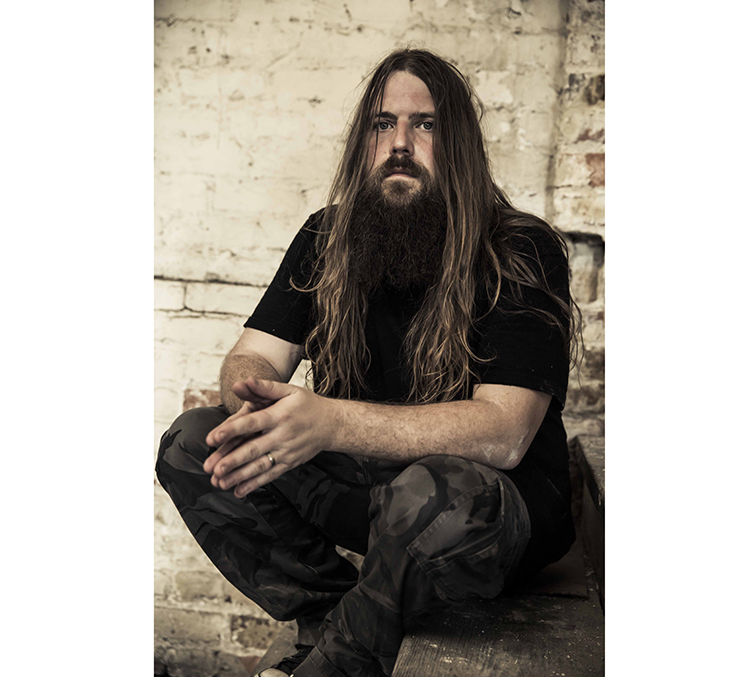
MM: Yeah, you know, I think we sort of inadvertently...a band at our stage of experience, our level of...story that we’re at, you know what I mean?...
GG: Mm-hmm!
MM: What I’m trying to say is we’ve been around a long time!
GG: That’s a good way of putting it! ‘Stage of the story’!
MM: Stage of the story. Um, we’ve kind of gone through a lot of different versions of that, yeah. I mean, I think there have been times where we definitely have flirted with, like, all that religious kind of iconography, obviously the name, but even more than that: lyrically, some of the visuals that we have utilised, that kind of thing. I think that’s always been more kind of an homage to the traditional heavy metal, Judas Priest, Black Sabbath thing. Slayer certainly did their version of that.
GG: Yeah!
MM: So, Testament too, you know what I mean?
GG: Totally.
MM: So, that’s just sort of in the tradition of thrash metal, or just metal in general.
GG: If you grow up loving metal, you grow up loving that stuff.
MM: Yeah, so I think that stuff has been more like that. We’ve never been, as a group or individually, ever particularly connected or disconnected...
GG: Or had an agenda?
MM: Or had an agenda toward organised religion or anything like that. It’s always just been the tradition of heavy metal. At times we’ve gotten very political, and I can say we still do that. We will still be doing that, but other than that...yeah, sometimes it’s cool to talk about what you’re talking about: y’know, spooky kind of like, otherworldly, spectral-type stuff. But I think, really, for the more part, other than, like, political stuff, I think Randy and I lyrically get really into just sort of personal, um, personal experience.
GG: Yeah.
MM: There’s been a lot of songs about, uh, personal trauma, just sort of dark experiences, conflict, relationships, addiction, just all that kinda stuff. We really, I mean, if you read through the lyrics of the Lamb of God discography, I think you can...certainly I can speak for myself that you can really tell what’s been going on with me in the last 15 or 20 years! (cracks up laughing) Cuz it’s all in there!
GG: Haha, ok! And so, I guess with, um, certainly from the point of view of a listener, the things I get from it are: think for yourself, and triumph over the bad shit. Through perseverance.
MM: Yeah!
GG: Would you agree with that?
MM: Yeah, I think so, yeah. That’s a fair assessment. I’ve never really thought of it as sort of an overview like that.
GG: Oh, right! Okay!
MM: With like a continuing theme because , like, it’s, in a lot of ways, if you took someone’s journal and just grabbed random pages out...no, took two people’s journals and flipped through them and just grabbed random pages out of it, it’s like a mosaic of where our heads were at, at the time.
GG: Sure. And for the solo stuff, that’s gonna be one person’s journal...
MM: Yeah.
GG: And is it the same process for the lyric writing? Just going to the same journal?
MM: Really personal stuff, yeah! For me even more so because I don’t have, necessarily...I don’t have to put it through the filter of the other guys. I have a producer...
GG: Mm-hmm
MM: ...who tells me when I’ve got really shitty lyrics. But also, the other thing about the solo stuff is that I don’t write all the lyrics.
GG: Oh.
MM: On Anaesthetic, for example, Cross off, Chester and I co-wrote. The Mark Lanegan song, he wrote all the lyrics for that.
GG: I thought they were very Lanegan-esque lyrics!
MM: Yeah. Oh man, I can’t...how thrilled I was to get Mark! We’re friends now! I got into his house, we text and stuff. He’s like my friend, but when I reached out to him, I was just a fan! I was giddy that he was into it.
GG: That’s wicked, man.
MM: He’s like (adopts super-low voice) ‘Send me the song!’
GG: That’s like being pals with Hellboy and Tom Waits mixed together, isn’t it?
MM: Haha! But now, I wrote two songs with him for his upcoming release this year.
GG: Brilliant! He’s very hard to get hold of. I’ve been trying to get him for an interview so if you tell him I’m a good guy...
MM: Haha, yeah, he’s a pretty private guy. Yeah. He’s one of the coolest people I’ve ever met.
GG: I bet he is!
MM: He’s a cool dude.
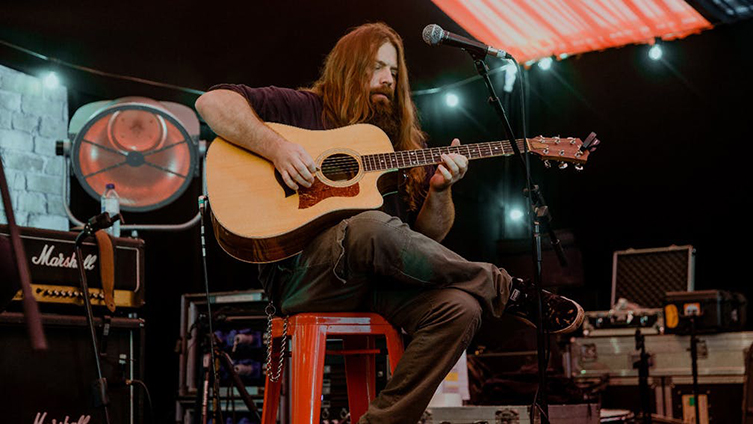
GG: So, with all the singers you use: do you sing yourself? Like, even on demos?
MM: Um, yes, I did sing! There’s a song on Anaesthetic called Imaginary Days: that’s me singing.
GG: Oh! My bad: sorry, I didn’t realise.
MM: No, no, it’s fine! Yeah, I sang that in the studio. You know, I sing alright! What I don’t do well is sing and play guitar at the same time. So, we’ll play it tonight and Mark’ll sing it. If I’m gonna have Mark Morales with me, it’s better for everybody if he sings it! (laughs) I sing okay, I’m an okay background singer. Imaginary Days turned out really cool and I was happy with that recording of it, but I’d never aspire to be a frontman or that guy.
GG: You kind of have to have that gene.
MM: It’s not my personality. There’s a reason I play guitar: it’s because I’m a guitar player.
GG: Haha, it’s good to know that about yourself, isn’t it?
MM: Haha, yeah, yeah.
GG: And with your guitar playing, it’s pretty technical stuff. Do you still have to do a lot of practising?
MM: I’m so terrible, I’m so terrible. (laughs) No! No! And yet I should! What I do...I do play guitar, so there are two ways I play guitar: one is I’m writing, and these days it’s more about songwriting for me. I aspire to be, I realised...I’m a songwriter who writes on guitar. I wanna write songs, and I happen to know how to play guitar, so I write on guitar. If that song needs a guitar solo, I can do a pretty good guitar solo, too.
GG: Sure you can!
MM: I don’t sit at home and, like, sweep pick and run through the scales and learn new modes and patterns and positions and shit like that. There are guys who do that and God bless them.
GG: Oh, totally! But even before a tour, do you have to sit down and get back to it? Learn stuff?
MM: Yeah! So, I don’t go home and play Lamb of God songs in between Lamb of God tours. Full disclosure: I don’t! So what I will do a week before we start a tour is, we’ll agree on the setlist and I’ll start on the setlist. If you’re gonna play in front of 12000 people, you may as well know how to play your songs!
GG: You may as well!
MM: Lamb have recorded over a hundred sons at this point, so I don’t know (how to play) all those songs! (laughs) You know what I mean?
GG: Haha! And they’re not Bob Dylan songs that all use three chords!
MM: Yeah, where you could put a little chart out.
GG: So, I guess, briefly, because I don’t want to keep you away from things any longer, and I ran out of questions ages ago (Mark laughs), but one thing I was gonna ask is: (whispered) when is the next Lamb of God album out?
MM: We don’t have a date yet, but I can tell you that it will be this year, and I think it’s safe to say, the first half of the year.
GG: Nice. Now, my very final question is: without thinking about it too much, what is the greatest guitar riff ever?
MM: Well...riff?
GG: Single riff or collection of riffs within a song.
MM: Uh, yeah, I mean there’s...I think Whole Lotta Love’s pretty iconic for me. It’s really simple but it’s hypnotic, it’s powerful, it kind of defines almost an entire genre. Is it my favourite Zeppelin song? Nope. But in terms of single riff, that’s it.
With that, Mark’s Tour Manager came in to signal that time was up. I said goodbye to Mark and left entirely satisfied with what we’d managed to cover. It’s always enjoyable to talk to artists about what they (and we all) do, but it’s especially good when it’s someone who is not only friendly but very capable of talking about their art and process.
The show itself has a gift to fans of the band, and to fans of guitar music in general. In addition to Mark’s own songs, the trio performed stunning renditions of Alice in Chains’ Down in a Hole and Black Sabbath’s Planet Caravan. Good choices! Mark announced that he’d hang around after to say hello to fans, which resulted in an enormous queue of eager (and, let’s face it, a little bit beer’d up) audience members, all delighted to shake hands, get a picture and have something signed. It was a fitting way to finish a performance that was filled with skill, passion and goodwill.
Mark will be back soon with Lamb of God, touring the UK and Europe this Spring. You can check out Anesthetic and Ether at the official Mark Morton website. Find upcoming Lamb of God tour dates, and details about the forthcoming record, from the official Lamb of God website.
Click through to check out our selection of Jackson Mark Morton signature Dominion guitars.
I’d like to thank Mark for making time for me, and for being such good company. I’d also like to thank Kirsten and Brian for all of their help in setting this up and making it happen!
Thanks for reading,
Until next time!



